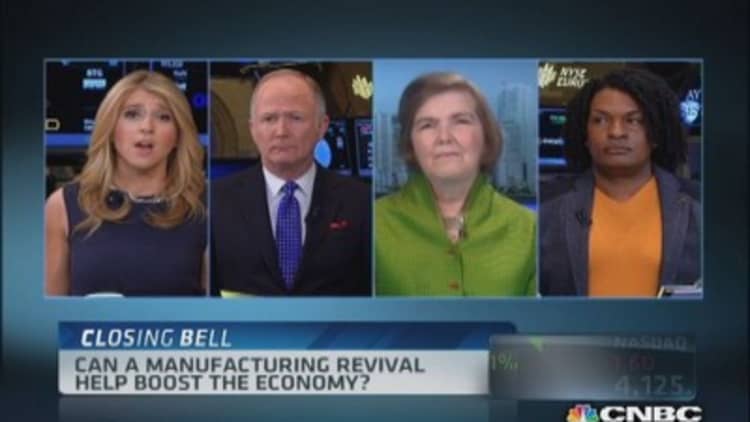The slow start to the West's manufacturing revival is under threat from a shortage of skilled workers, experts told CNBC.
"The opportunity for an economic renaissance is there—but there is a lot of work to do in intriguing the workforce in," said Jon Riley, the vice-president of digital manufacturing for the U.S.'s National Center for Manufacturing Sciences.
"The challenge is absolutely monumental."
The U.S. and the U.K. have become increasingly competitive on the world manufacturing stage in the last decade as companies ramp up production as the world recovers from the global financial crisis.
Read MoreUK and US rival emerging markets in manufacturing
According to a report published jointly by Accenture and the Manufacturing Institute this month, half of U.S. companies plan to increase U.S.-based production by at least five percent in the next five years.
And this time around, the manufacturing is high-tech and high-skill.
However, their plans for expansion may be scuppered by a dearth of workers with the skills needed for this new high-tech world. More than one third of surveyed companies saying they faced a "severe" shortage of qualified applicants, and 60 percent finding it difficult to hire skilled staff.
Accenture found that as a result of increased production costs stemming from skills shortages, companies risked a cut to annual earnings of 11 percent, or $4.6 million on average.
"The skills shortage facing U.S. manufacturers is apparent from this report, and its severity can be measured in dollars," said Matt Reilly, senior managing director of Accenture Strategy, North America, in the report.
"U.S. manufacturers' plans to increase production and grow manufacturing roles over the next five years are positive indicators, but are likely to exacerbate the problem."

Riley said that part of the problem was that manufacturing and engineering had to compete with newer sectors like computer science in attracting technically minded youngsters.
"Manufacturing is nowhere in their list," said Riley. "In the U.S., a lot of young people don't want to be an industrial or product engineer… they want to go and make computer games, if they like things like that."
He attributed the lack of interest to the absence of flagship engineering projects, like the U.S. space programs of the 1960s, 70s and 80s.
"Why did I go into engineering? It was the space program, watching NASA. That mesmerized me as a kid… You don't see much of it now," he said.
Those that do study engineering may find themselves ill-equipped to enter the workforce, however, Riley added.
"A lot of research institutions are very good at the theoretical side, but there is a gap on the applied side… MIT, Stanford, Berkley, Illinois and other big schools, they are all very theoretical," he said.
Some companies are working with colleges to ensure that students are instilled with the necessary skills. For instance, Stratasys employs an education director whose duties include working with universities on course content.
"We are preparing curriculum for technology, and for it being embraced at a younger age," said Shelly Linor, the global head of education at the 3D-printer manufacturer.
She said the buzzword for engineering courses was "interdisciplinary".
"A mechanical engineer, for instance, should know more about materials and designs," Linor said. "They will need to know more about how materials behave, and about the design itself."
However, a large majority of companies were yet to incorporate elements of other disciplines like design or computer software programming, she warned.
Companies also need to do more to ensure their existing staff members have the skills required.
"It is a balance of reskilling some of the people they have in-house, and changing the profile of the people they recruit, and the way in which they recruit," Russ Rasmus, the managing director for manufacturing at Accenture Strategy, told CNBC.
"Before, firms were more manual labor-focused. Now, people are working on machinery which needs manual skills plus digital skills. It's very computerised – operators need to be able to analyse data and adjust machinery based on what they see."
Rasmus concurred that firms should work alongside education facilities, but said that they would gain no immediate return.
"That is a long-term view of the situation… they are not going to reap any benefit of that soon," he warned.

